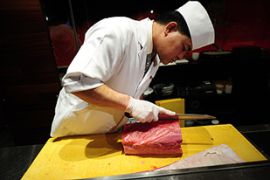Second bite for shark protection
Delegates at wildlife conference in Doha set for another vote on scalloped hammerhead.

Currently, international trade in sharks is almost entirely unregulated.
Once plentiful, the hammerhead has been fished to the edge of viability to satisfy a burgeoning demand for sharkfin soup, a prestige food eaten in Chinese communities around the world.
Between 1.5 and 2.3 million specimens are pulled from the seas every year and most are then tossed back into the water to die after their fins have been sliced off.
Critically endangered
Japan, however, is likely to seek the reversal of a decision to extend Appendix II status to the porbeagle, the only one of four sharks up for review to gain Cites protection.
| special report | |
|
“Japan is working the corridors, trying to line up votes,” Matt Rand, a shark specialist at the Pew Environment Group in Washington DC, said.
In Doha, the Japanese delegation has vocally opposed all efforts to impose trade restrictions on high-value marine species, and led the successful campaign to vote down a proposed Appendix I ban on cross-border commerce in Atlantic bluefin tuna.
Fished mainly for its meat rather than its fins, the cold-water porbeagle is listed by the International Union for the Conservation of Nature (IUCN) as “critically endangered” in the Mediterranean and northeast Atlantic, and as “vulnerable” globally.
Joined by China and many other developing nations, Japan acknowledges that many marine species are in decline but argues that regional inter-governmental fisheries are the best tool to manage stocks, not Cites.
“There have been a number of countries here who have lobbied against proposals to list species on Cites Appendices, but I think one country stands out in particular for criticism and that is Japan, whose delegation here has been many times the size it normally is,” Oliver Knowles, an oceans campaigner with Greenpeace International, told Al Jazeera.
“Their lobbying tactics have been extremely aggressive and described to us as aggressive by a number of African nations and it is clear to us that their lobby has been designed to overturn the vote on blue fin tuna because they have an interest in sushi.
“If they were interested in securing a long term supply of the species for the purposes of sushi, you’d think they’d have an interest in conservation but not so, it’s short term economic interests winning over long term conservation.”
Ivory trade
Zambia may also try to downgrade the protection status of its elephants from Appendix I to the less restrictive Appendix II.
Its first attempt was rejected in a secret ballot, with 55 in favour and 36 opposed, several votes shy of the two-thirds majority needed to pass.
There were 40 abstentions, however, providing ample opportunity for lobbying ahead of a second vote.
Zambia withdrew a separate bid in Doha for a one-off sale of 21.7 tonnes of stockpiled tusks, but would probably seek authorisation at the next CITES meeting three years from now if the downlisting bid succeeds.
Both China and Japan, the only authorised markets for ivory, backed the sale, which is opposed by the United States and the European Union.
Conservationists are also lobbying hard, and trying to make sure certain delegations remain until the very end of the plenary to cast their votes.
